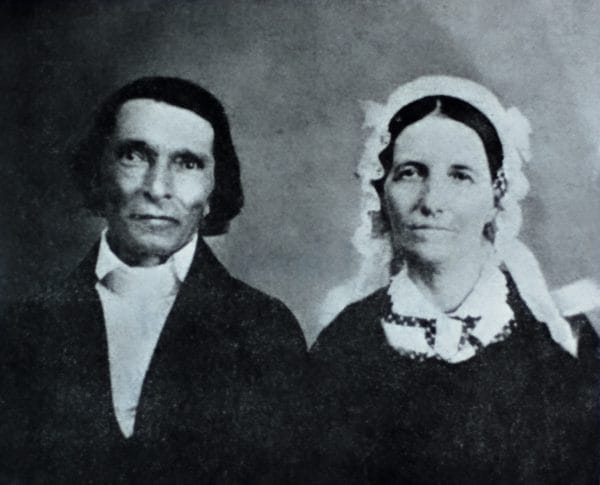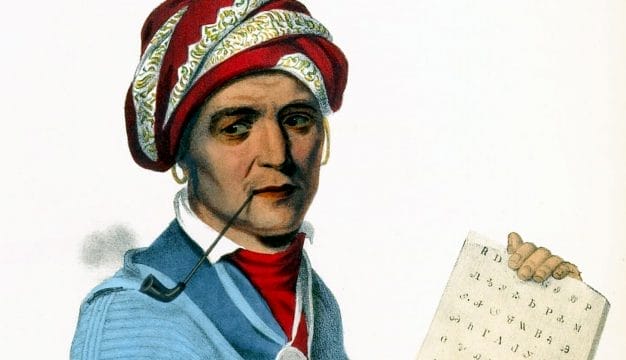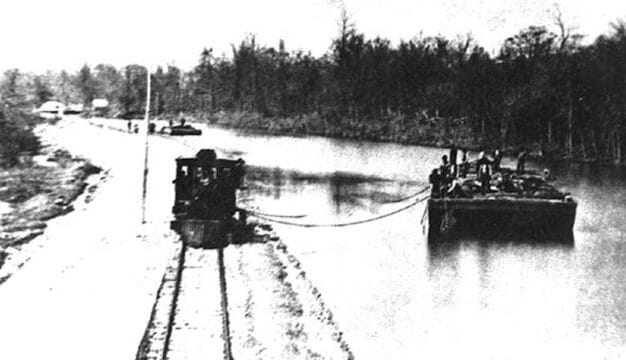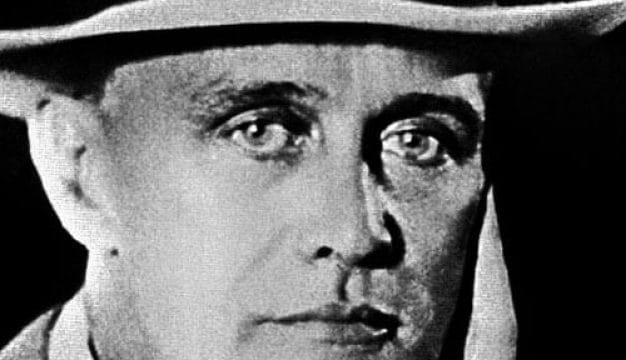Lee and Susannah Compere
English missionaries Lee (1790-1871) and Susannah (ca. 1797-1833) Compere arrived in Alabama in 1822 and spent a decade caught up in the tensions between white, black and Creek Indian cultures. As abolitionists and champions of what Lee termed “the cause of humanity,” they clashed with slaveowners—both white and Creek—and made powerful enemies on both sides of the Indian removal debate.
 Lee and Sarah Jane Beck Compere
Lee Compere was born to John and Grace Fox Compere in the town of Market Harborough, in Leicestershire, England, on November 3, 1790. Orphaned at age six, Lee and his younger sister, Betsy, were raised by a family of Baptists. Lee’s 15-year-old sister Jane was left to care for herself. All three Compere children eventually embraced the Baptist faith, but none more actively than Lee, who devoted his life to ministry. In 1815 the Baptist Mission Society (BMS) of England appointed Compere to serve as a missionary among the enslaved people in the British colony of Jamaica. While visiting a church shortly before he was to leave, Compere was introduced to Susannah Voysey, the mission-minded 18-year-old daughter of a wealthy London family. Lee and Susannah married within weeks of meeting and departed for Jamaica in late 1815.
Lee and Sarah Jane Beck Compere
Lee Compere was born to John and Grace Fox Compere in the town of Market Harborough, in Leicestershire, England, on November 3, 1790. Orphaned at age six, Lee and his younger sister, Betsy, were raised by a family of Baptists. Lee’s 15-year-old sister Jane was left to care for herself. All three Compere children eventually embraced the Baptist faith, but none more actively than Lee, who devoted his life to ministry. In 1815 the Baptist Mission Society (BMS) of England appointed Compere to serve as a missionary among the enslaved people in the British colony of Jamaica. While visiting a church shortly before he was to leave, Compere was introduced to Susannah Voysey, the mission-minded 18-year-old daughter of a wealthy London family. Lee and Susannah married within weeks of meeting and departed for Jamaica in late 1815.
The Comperes’ missionary efforts in Jamaica were successful in terms of building a congregation of baptized believers, but the couple apparently angered the BMS by openly opposing slavery. They also had their first child, a daughter, while in Jamaica but she died aboard ship when the couple relocated to South Carolina in 1817. Lee and Susannah went on to have eight more children together, seven of whom survived.
Called to Mission
Lee apparently made a name for himself preaching and teaching alongside prominent South Carolina Baptists, but the couple still felt called to the mission field. When several Georgia Baptist associations called for missionaries to establish a school at the Creek Indian town of Tuckabatchee, near modern-day Tallassee, Alabama, the Comperes happily accepted. The family, which now included Lee’s sister Jane, moved to Tuckabatchee in 1822 and opened a school called Withington Station the following year.
The Comperes largely ignored the terms of the official agreement between the Creeks and the Georgia Baptists: the Creeks wanted Western-style education for their children but prohibited Christian evangelism. As they had in Jamaica, when the Comperes found that politics and cultural beliefs conflicted with what they viewed as their calling, they followed their calling. This inevitably invited controversy. The first years of the work at Tuckabatchee were relatively smooth, however. The Comperes taught classes to the Creek students, ministered to small communities of Christians of various cultures living within the Creek Nation, and reported to their Baptist and U.S. government supporters all that they observed about the largely undocumented Creek culture. They were, in a sense, also missionaries from the Creeks to the whites, and their observations helped the government and other missionaries better understand southeastern Indian culture.
Unfortunately, the Comperes’ attempts to promote understanding were overwhelmed by the powerful political forces at work. In 1825 a small group of Creek leaders claiming to represent the entire nation signed the Treaty of Indian Springs, selling to the Americans enormous tracts of Creek land. The treaty was clearly fraudulent, and Lee Compere openly denounced it. He also was falsely rumored to have been involved in the retaliatory killing of William McIntosh, the leader of the Creek faction that approved the treaty. The Comperes’ Georgia sponsors were outraged by Lee’s outspokenness in defense of Creek rights and withdrew financial support for the mission. Lee found new sponsors among Baptist leaders in other parts of the country, but such fundraising increasingly forced him to take time away from teaching and preaching.
Among the Creeks, as in Jamaica, the abolitionist Comperes found a receptive audience for Christianity among black slaves. Creek slave-owners eventually responded by forbidding their slaves to visit Withington Station. The Comperes continued their ministry, but at a terrible cost to the enslaved. While Lee was away from the mission in May 1828, a party of Creeks entered the station as Susannah led church services. The Indians dragged the slaves into the yard of the station and tortured each in turn. When Lee returned, one of the Creek participants explained that the violence resulted from an increasing sense of frustration and hopelessness among the Creeks owing to continued betrayals by whites.
Leaving the Creeks
The violence at the station was the beginning of the end of the Comperes’ work among the Creeks. Lee feared leaving his family alone and in any case had long since grown weary of the fundraising, bureaucratic frustrations, and widespread opposition to his work. It also seemed increasingly clear that the Americans would soon succeed in parting the Creeks from their land.
Although Lee was suspicious of American intentions, he quietly advocated the voluntary removal of the Creeks—not because he wanted Americans to have the Creek land but because he wanted the Creeks to be free from what he saw as the dangerous pressures of an encroaching, greedy, un-Christian culture and the internal political corruptions he felt it bred among Creek leaders. His vision, essentially, was for a new Creek Nation in the west, where Creeks, under the protection of the U.S. government, could choose new leaders who would embrace Christianity.
In 1829 the Compere family left the Creek Nation and settled on a farm near Montgomery. The couple established another school, founded the First Baptist Church of Montgomery, and served in several roles for the Alabama Baptist Convention. In 1833 they moved to Benton, Mississippi, and Susannah died on September 6 the following year while nursing victims of an epidemic. The family moved to Tennessee for a year, and then returned to Mississippi, settling in Holly Springs. In 1836 Compere married Sarah Jane Beck, with whom he had one surviving child, Sarah Channing, and continued to preach in addition to earning a modest living at farming and managing small business ventures. In his final years, Lee lived with his son Thomas in Arkansas and Texas, and died near Corsicana, Texas, on. June 15, 1871.
Lee and Susannah Compere left to Alabama a remarkable legacy of courage and concern for what Lee called “the cause of humanity.” Their willingness to speak out against injustice wherever they found it anticipated the civil rights struggles of the twentieth century. Each of the Comperes’ sons entered the ministry and served in education.
Further Reading
- Compere, Lee. “Letters and Journals of Lee Compere.” Valley Forge, Pa.: American Baptist Historical Society Papers (copy in Special Collection Department, University Library, Samford University), 1823-1833.
- Flynt, Sean. “In Singleness of Heart: Origins of the First Baptist Mission to the Creek Nation.” Alabama Baptist Historian 38 (July 2002): 15–24.
- Hickerson, Amy Compere. The Westward Way. Atlanta: Home Mission Board, 1945.



